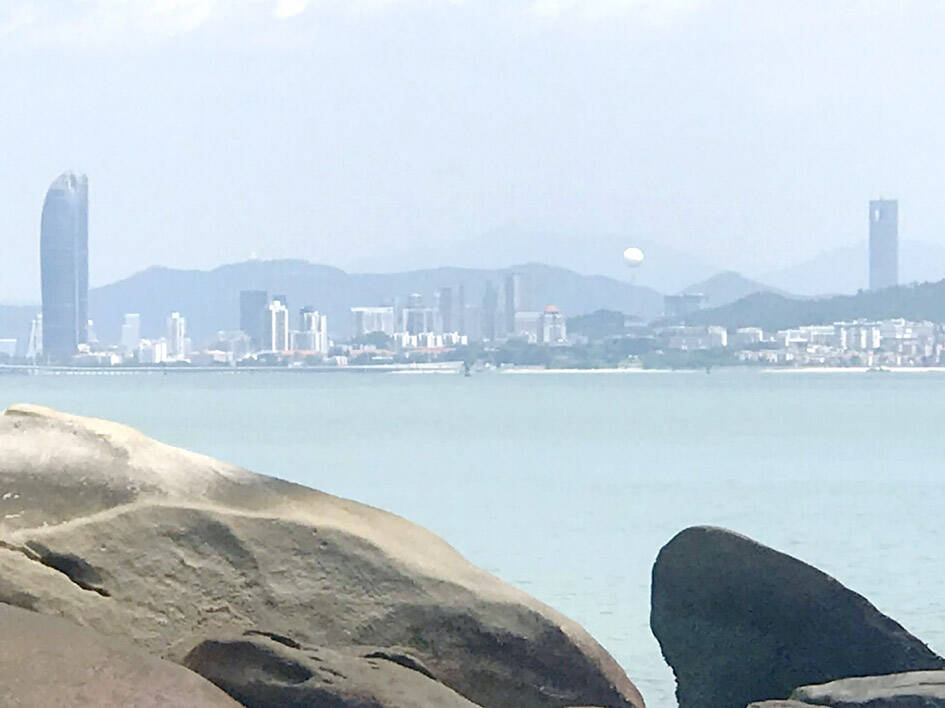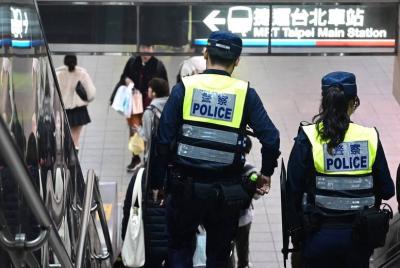Pointing at Xiamen’s skyscrapers in China, across the water from his office, Chen Tsang-chiang (陳滄江) recalled how 30 years ago the southern Chinese city was as low-slung as Kinmen County.
In the following decades, the 68-year-old former politician watched the metropolis of 5 million people rise, while Kinmen’s forests, sorghum fields and villages saw little change.
What the county, which is about 5km off China’s coast, needs is a bridge to Xiamen, “a connection to an economic lifeline,” Chen says.

Photo: CNA
However, the proposed bridge has become a flashpoint ahead of Saturday’s presidential and legislative elections, drawing leaders from all major parties to the county to speak about its construction or national security. It strikes at the heart of the most important question voters will be answering in the polls: How should Taiwan relate to China?
Kinmen is a stronghold for the main opposition party the Chinese Nationalist Party (KMT). Like many in Kinmen, Chen sees China as the key to development and he said residents should be able to vote on the proposed bridge.
“Must this 151km2 small island, with tens of thousands of people, forever be a chess piece for both sides of the strait?” he asked. “Do we not have a voice?”
For Taiwan, Kinmen is the front line of democracy and the closest point to China where its electors are to cast ballots. For China, Kinmen is a litmus test for its ability to bring Taiwan under Beijing’s control and a prime target in its charm offensive.
In September last year, China unveiled its most comprehensive blueprint yet for cross-strait integration, featuring stronger transport, energy and business links between Xiamen and Kinmen. A Chinese official in November last year said that construction on the Xiamen side of a bridge that could connect to Kinmen had begun.
New Taipei City Mayor Hou You-yi (侯友宜), the KMT’s presidential candidate, vowed to hold a local referendum on the bridge, saying he would build “the most important symbol of cross-strait peace” if residents wanted it.
The Democratic Progressive Party (DPP) administration, through the Mainland Affairs Council, dismissed Beijing’s proposals as “wishful thinking” and a futile attempt to win over Taiwanese with economic incentives. The council called the bridge “a Trojan horse carrying tremendous national security risks.”
China said “reunification” with Taiwan is inevitable and it has never renounced the use of force to bring it under its control.
China has taken particular exception to the DPP’s presidential candidate, Vice President William Lai (賴清德), saying he is a dangerous separatist.
Lai has said he would maintain the “status quo” and that only Taiwanese can decide their future.
The KMT also said Taiwan’s 23 million people should decide their future, although it strongly opposes independence.
Some of about two dozen Kinmen residents interviewed for this story welcome the bridge as a sign that Taipei and Beijing could work together, a driver of growth, or a way to travel unconstrained by the ferry schedule.
Others, especially younger voters, fear it would usher in unwanted investment and erode the political freedoms Kinmen enjoys as part of Taiwan. Many from this growing group identify as Taiwanese rather than Chinese and want to promote Kinmen’s culture and rely less on China for economic opportunities.
One of them is bookstore owner Weng Yu-wen, 34. She was part of the 22 percent in Kinmen who in 2020 voted for the DPP’s candidate, President Tsai Ing-wen (蔡英文), as the party nearly tripled its support in the county in the 2012 poll.
Plastered on the wall of Weng’s bookstore is a poster that says: “Youth return to your hometown to vote for a better future.”
The shelves are lined with social and political books, including one titled What is Democracy?
As is common for Kinmen’s younger generation, Weng studied and worked on Taiwan proper before returning. She said she hopes her books and events will spark discussion of public affairs.
When the ferries stopped during the COVID-19 pandemic, “we could very clearly feel that we are indeed two different countries,” Weng said.
Before that, residents often took the ferry to Xiamen — where many have property, business, or family — for entertainment or grocery shopping.
The frequency is natural given geographic proximity and historical ties, Weng said, but she worries that a bridge would further blur the boundary between their political systems.
“If Kinmen grows closer to mainland China, would this still be a place where I want to live?” she asked. “Why does it seem like there is only one possibility for development?”
Kinmen residents once made their living serving the tens of thousands of Taiwanese soldiers stationed here until martial law was lifted in 1992. In 2001, the establishment of a 30-minute ferry service between Kinmen and Xiamen marked the beginning of the county transforming into a magnet for Chinese tourists.
From Kinmen’s northern coast, cranes constructing a massive airport to serve Xiamen are visible. The most likely bridge route would connect Kinmen to Xiamen via this airport, Deputy Kinmen Mayor Li Wen-liang (李文良) said.
He estimated it would extend up to 8km and cost more than US$322 million.
The prospect of greater cross-strait integration spurred Taiwanese investors to buy most of the 118 units in Kinmen’s first serviced apartment building, said Henry Lee, general manager at Chiau-Mau Realty, which has overseen sales.
Advertisements for the building — which opened one year after Chinese President Xi Jinping (習近平) in 2019 outlined his vision for “integrated development” — show higher property prices in Xiamen than in Kinmen.
“If people can enter, money can enter,” reads one brochure featuring a map of the proposed bridge.

Beijing could eventually see a full amphibious invasion of Taiwan as the only "prudent" way to bring about unification, the US Department of Defense said in a newly released annual report to Congress. The Pentagon's "Annual Report to Congress: Military and Security Developments Involving the People's Republic of China 2025," was in many ways similar to last year’s report but reorganized the analysis of the options China has to take over Taiwan. Generally, according to the report, Chinese leaders view the People's Liberation Army's (PLA) capabilities for a Taiwan campaign as improving, but they remain uncertain about its readiness to successfully seize

Taiwan is getting a day off on Christmas for the first time in 25 years. The change comes after opposition parties passed a law earlier this year to add or restore five public holidays, including Constitution Day, which falls on today, Dec. 25. The day marks the 1947 adoption of the constitution of the Republic of China, as the government in Taipei is formally known. Back then the Chinese Nationalist Party (KMT) governed China from Nanjing. When the KMT, now an opposition party in Taiwan, passed the legislation on holidays, it said that they would help “commemorate the history of national development.” That

Taiwan has overtaken South Korea this year in per capita income for the first time in 23 years, IMF data showed. Per capita income is a nation’s GDP divided by the total population, used to compare average wealth levels across countries. Taiwan also beat Japan this year on per capita income, after surpassing it for the first time last year, US magazine Newsweek reported yesterday. Across Asia, Taiwan ranked fourth for per capita income at US$37,827 this year due to sustained economic growth, the report said. In the top three spots were Singapore, Macau and Hong Kong, it said. South

Police today said they are stepping up patrols throughout the Taipei MRT system, after a social media user threatened to detonate a bomb at an unspecified station this afternoon. Although they strongly believe the threat to be unsubstantiated, Taipei Metro police and the Railway Police Bureau still said that security and patrols would be heightened through the system. Many copycat messages have been posted since Friday’s stabbing attacks at Taipei Main Station and near Zhongshan MRT Station that left three dead and 11 injured, police said. Last night, a Threads user in a post said they would detonate a bomb on the Taipei